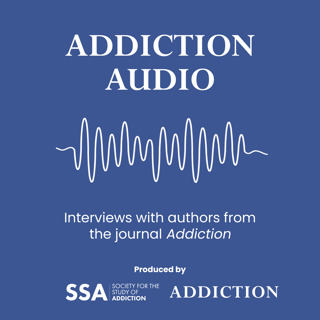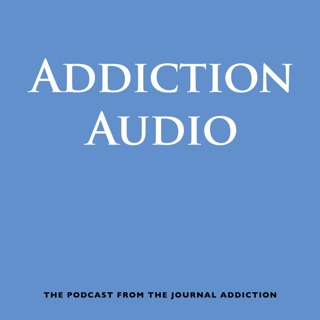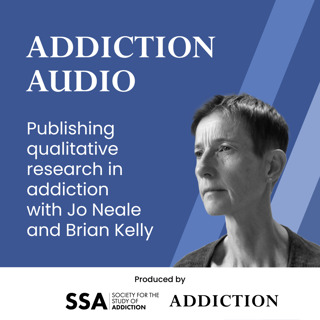
Vaping and smoking cessation with Vassilis Sideropoulos
Rob Calder talks to Vassilis Sideropoulos about a recent paper on the role of vaping products in smoking cessation. The first author for this paper was Dr Catherine Kimber.Vassilis talks about the array of components that can contribute to quitting smoking when using vaping products. He summarises the research team’s work on identifying which combinations of support types are most effective. He talks about their research into advice on vaping products, nicotine strength and e-liquid flavours, as well as providing information on the relative harms of vaping and smoking and text message support.There's so many different flavours right now you can pick up almost anything now..... it's a massive raise and I think that's why flavour is a component that we need to understand better.Vassilis also talks about the challenges of recruiting participants from social media and how to exclude bots from your research participant group.Original article: E-cigarette support for smoking cessation: Identifying the effectiveness of intervention components in an on-line randomized optimization experiment by Catherine Kimber and colleagues. Published in Addiction (2023) Hosted on Acast. See acast.com/privacy for more information.
24 Aug 202324min

Overdose risk, opioid agonists and other medications with Eleni Domzaridou
Rob Calder talks to Dr Eleni Domzaridou about her recent article on the risk of overdose among people prescribe medication for opioid use at the same time as being prescribed other medication - such as for mental health disorders.People who use opioid drugs are often prescribed drugs for physical or mental health problems or for pain management. Eleni and the research team studied non-fatal overdoses among this group of people. In this podcast, Eleni outlines why the marker of non-fatal overdose is important when seeking to prevent fatal overdoses. Eleni also talks about the challenges and practicalities of using a large data-set with data from GP surgeries to draw conclusions about associations between prescribed drug use and overdoses.There is an elevated non-fatal overdose risk for patients prescribed opioid agonists concurrently with benzodiazepines, gabapentinoids, z-drugs or antipsychotics.Original article: Non-fatal overdose risk associated with prescribing opioid agonists concurrently with other medication: cohort study conducted using linked primary care, secondary care, and mortality records by Eleni Domzaridou and colleagues. Published in Addiction (2023) Hosted on Acast. See acast.com/privacy for more information.
17 Aug 202318min

Methamphetamine, psychosis and family history with Rebecca McKetin
In this episode Ben Scher talks to Dr Rebecca McKetin about her recent article looking the relationship between psychosis, psychotic symptoms and methamphetamine use. They discuss the implications and talk about who exactly is at risk of methamphetamine-related psychosis. Along the way, they cover the background of methamphetamine use in Australia and how this varies from country to country.They then discuss the relative risk for psychotic symptoms among people with and without a family history of psychosis. The risk also changes when people are (or are not) actively using methamphetamine. Rebecca also talks about the potential for people to progress to schizophrenia and how treatment services should respond. Rebecca talks about the range of interventions that could be used to address methamphetamine related risks use and drug-related mental health problems.We need to target methamphetamine use as a risk factor for psychosis, regardless of whether people have a history of psychosis on their family.... the other one is that we need to be looking at people who do have a family history of psychosis at being at very high risk of having psychotic symptoms.Original article: How does a family history of psychosis influence the risk of methamphetamine-related psychotic symptoms: Evidence from longitudinal panel data by Rebecca McKetin and colleagues. Published in Addiction (2023) Hosted on Acast. See acast.com/privacy for more information.
10 Aug 202318min

Hallucinogen use, young adults and monitoring the future with Katherine Keyes
In this episode, Dr Elle Wadsworth talks to Dr Katherine Keyes about her study examining changes to hallucinogen use among young adults in the US. Katherine also talks about using the Monitoring The Future survey to identify patterns of substance use among young adults."...going from 2020 to 2021 we really saw substantial increases in the prevalence of young adults who are reporting that they use hallucinogens other than LSD. And we didn't see the same trend of use of LSD."Original article: Hallucinogen use among young adults ages 19–30 in the United States: Changes from 2018 to 2021 by Katherine M. Keyes and colleagues. Published in Addiction (2023) Hosted on Acast. See acast.com/privacy for more information.
3 Aug 202323min

Perspectives on gambling from 1561 with Louise Nadeau
In this episode Ben Scher talks to Professor Louise Nadeau about her recent article anaysing the content of a Latin-language treatise on gambling addiction written nearly 500 years ago. Ben and Louise discuss the medical model of gambling and issues of historic identification. They unpick how the original authors wrote about the medical model of addiction long before it was called that. Parts of the treatise refer to non-problematic gambling - noting that there was a small population who had problems. There are also references to gambling harms and models of treatment that go back to the 6th century AD. This podcast offers a fascinating historical insight in a way that illuminates our current understanding of addiction and co-occurring disorders."So here was this person in 1561 who was thinking of erroneous cognitions who thought of genetic vulnerability - all that at the end of the Renaissance."Original article: A re-discovered treatise from 1561 by Louise Nadeau and Marc Valleur. Published in Addiction (2023) Hosted on Acast. See acast.com/privacy for more information.
28 Juli 202323min

Risk of bias in tobacco cessation trials with Jamie Hartmann-Boyce
In this episode, Chloe Burke talks to Dr Jamie Hartmann-Boyce about new guidance from the Cochrane Tobacco Addiction Group (TAG) on assessing and minimising risk of bias in tobacco cessation trials. Jamie explains some of the key challenges in this area and explains some of the primary sources of bias that authors need to be aware of when analysing tobacco cessation trials. This article was published as part of Addiction's Methods and Techniques series."We wanted to do this to make sure people were assessing it [risk of bias] well, but also to put in some sort of consistency across our reviews so that the different author teams working on them were broadly using the same criteria"Original article: Assessing and minimizing risk of bias in randomized controlled trials of tobacco cessation interventions: Guidance from the Cochrane Tobacco Addiction Group by Jamie Hartmann-Boyce and Nicola Lindson. Published in Addiction (2023) Hosted on Acast. See acast.com/privacy for more information.
20 Juli 202320min

Cannabis legalisation in Canada with Janni Leung
In this episode, Dr Elle Wadsworth talks to Dr Janni Leung about her work on a systematic review of the evidence on cannabis arrests, cannabis products and prices since Canada legalised cannabis. Janni talks discusses how arrest figures have changed, along with trends in legal and illicit purchase of cannabis. She covers issues relating to cannabis packaging and the potential for this to have an impact on people who do not purchase cannabis. They also discuss cannabis legalisation in the context of driving and traffic-related injuries."We found that after cannabis legalisation there have been significant reductions in cannabis arrests. This means that less police time and efforts have been spent arresting people for cannabis use"Original article: The implementation and public health impacts of cannabis legalization in Canada: a systematic review by Wayne Hall and colleagues. Published in Addiction (2023) Hosted on Acast. See acast.com/privacy for more information.
13 Juli 202325min

Bacterial infections and social determinants of health with Thomas Brothers
In this episode Ben Scher talks to Dr Thomas Brothers about his qualitative systematic review looking at infections from injecting drug use. Tommy and Ben talk about bacterial and fungal infections and how social and structural factors can have a detrimental impact on access to treatment and health outcomes for people who use drugs. Tommy discusses the differences between countries, highlighting that the prevalence of injecting drug use is not always matched by increases in infections from injecting drug use. They talk about the influence of fentanyl, changes in drug use, drug supply and drug policy, whilst noting that the study found increases in bacterial infections that could not always be explained by these factors.In many of these countries there's been worsening economic and equality, worsening homelessness and our findings suggest that those sorts of economic policy factors are playing a big role in making people vulnerable to infections.Tommy also talks to Ben about conducting a qualitative systematic review, discussing the three steps of using thematic synthesis methods.Original article: Social and structural determinants of injection drug use-associated bacterial and fungal infections: A qualitative systematic review and thematic synthesis by Thomas D. Brothers and colleagues. Published in Addiction (2023) Hosted on Acast. See acast.com/privacy for more information.
12 Juli 202321min





















